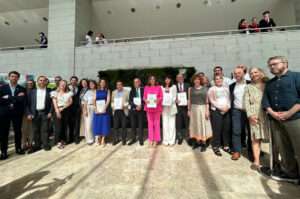It is now clear which projects have been granted funds in the call for Energy Positive Neighbourhoods, a collaboration between Viable Cities and JPI Urban Europe. Cities4PEDs, Interact, PED-ID and Trans-PED, all with Swedish partners, are now tasked with facilitating learning between cities and countries to create energy positive neighbourhoods in Europe.
The EU aims to reduce the carbon footprint of cities, which consume more than two-thirds of the world's energy and account for more than 70% of global carbon emissions. Cities are therefore central to the transition. As part of this European effort, the Positive Energy Districts and Neighbourhoods for Sustainable Urban Development (PED) program was launched in 2018 at the initiative of the SETPLAN for Positive Energy Districts Steering Committee and the European Commission.
Call #5 is Viable Cities' first international call. The cooperation and the call is run at EU level by the PED Program (SET Plan 3.2 - Smart Cities and Communities) and JPI Urban Europe, an initiative that promotes cross-border coordination of research and innovation for urban development.
The four awarded R&I projects all have a holistic approach to the city and will use digitalization and citizen engagement to accelerate the transition to energy-positive neighbourhoods and climate-neutral cities.
- The awarded projects perfectly meet the objectives of the call. We look forward to the projects' results on key aspects of PED, such as implementation, stakeholder inclusion strategies, cities as drivers of climate change, governance and legal frameworks, and technological and system innovation," says Christoph Gollner, Coordinating Program Manager for PED.
- The four projects have impressive transnational consortia and will therefore strengthen cross-border exchanges within PED," he adds.
The projects will last one to two years and all involve participants from several of the participating countries: Austria, Belgium, Czech Republic and Sweden.
Maria Lennartsson of the Exploitation Office, City of Stockholm, will work on one of the approved projects, Cities4PEDs, for the next two years.
- This is going to be very exciting. We have previously worked mostly at building level, so it will be new to work at area level.
Cities4PEDs is a cooperation project between Vienna, Brussels and Stockholm.
- It will be interesting to work with other cities outside Sweden. We want to get started as soon as possible, so we will begin work immediately after the New Year.
The PED program will support the planning, establishment and replication of 100 energy-positive neighborhoods in Europe by 2025.

The four projects
Cities4PEDs
In the Cities4PED project, the cities of Brussels, Vienna and Stockholm are working together to create energy-positive areas. They will explore how cities can adapt and use their planning and implementation instruments so that urban development results in areas that produce more energy than they use. In the project, they will work together with experts from research, innovation and citizen participation.
Participants from Sweden: Stockholm Vatten AB, Stockholm Municipality and KTH.
TRANS-PED - Energy positive neighborhoods transforming cities
Energy Positive Neighborhoods (PEDs) offer a great opportunity to accelerate the achievement of carbon reduction targets while creating more vibrant and livable cities. The goal of TRANS-PED is to develop a new way to drive systemic transformation for deep and holistic climate change adaptation in cities that can accelerate the transition to climate-neutral cities by 2030. Sub-objectives include developing common tools and approaches for framing, anchoring, assessing and scaling up urban energy innovations and building a learning network between academics, private companies, public authorities and civil society in participating countries.
Participants from Sweden: Linköping University, Lund Municipality, ElectriCITY Innovation and the Royal Institute of Technology.
PED-ID - Holistic evaluation of Positive-Energy-Districts and an innovative stakeholder engagement process
The aim of the project is to accelerate the transformation of Europe's energy system by scaling up the establishment of PED districts. The project will provide policy makers and other stakeholders with improved decision-making data on the opportunities and consequences of energy-positive districts at an early stage, and develop a knowledge-based participatory process. The project will support knowledge sharing with other European PED pioneers, the development of PED strategies and their integration into general urban development strategies. The project will prepare for energy positive neighborhoods in at least 3 European cities.
Participants from Sweden: Chalmers, Uppsala Municipality, Sustainable Innovation in Sweden and White arkitekter.
Interaction
The Interact project is based on a holistic approach to integrated renewable energy systems. A LINK architecture optimizes the key functions of energy production, energy efficiency and energy flexibility, integrating the existing technologies in a municipality. Based on different use cases, the system architecture with communication links within the energy community to the market will be described. The project will design an appropriate roadmap with relevant technical, regulatory, legal, economic and stakeholder aspects so that more energy positive neighborhoods can be implemented in practice.
Participants from Sweden: Halmstad Municipality, Halmstad University, Tornet Fastighetsutveckling AB, Bengt Dahlgren AB and AFRY.
Read more about PED on the JPI Urban Europe website.



